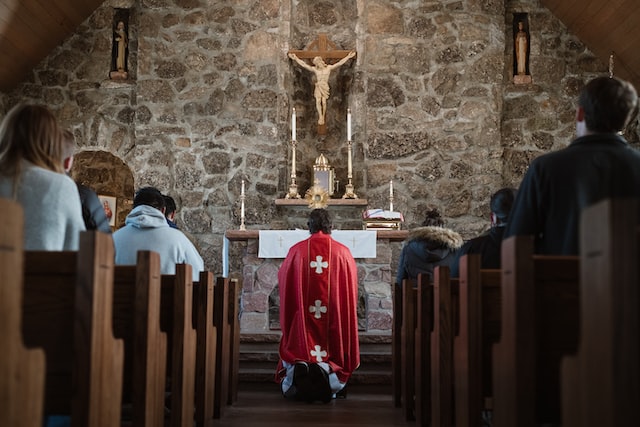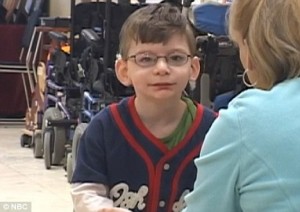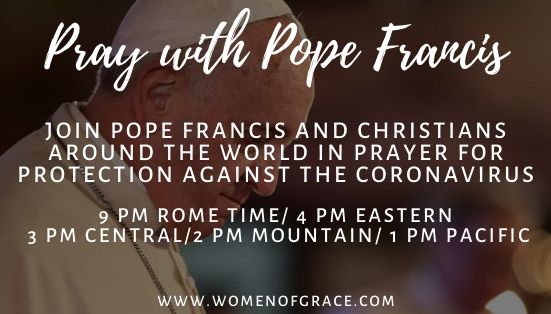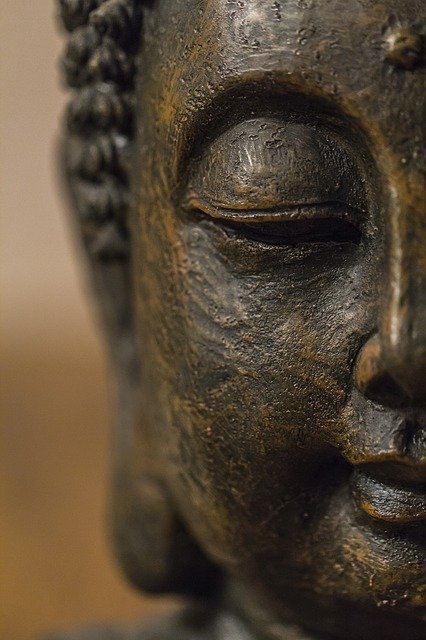 The Pew Research Center recently released a poll showing an alarming decrease in the number of Americans who consider themselves to be Christian, but a more focused poll conducted on Catholics in America produced much more hopeful results.
The Pew Research Center recently released a poll showing an alarming decrease in the number of Americans who consider themselves to be Christian, but a more focused poll conducted on Catholics in America produced much more hopeful results.
Category Archives: Uncategorized
The Cloth of Compassion
Jesus walked the path of suffering alone. Almost all His friends ran away. Some betrayed Him. Some denied Him. Some just stood by and watched from afar. Few who knew Him offered a helping hand.
New Witchcraft Books Aimed at Youth
The Occult Roots of Spiritual Response Therapy
Toddler Born With “Missing” Cerebellum Makes Astonishing Progress
By Susan Brinkmann, OCDS
Staff Journalist
A three year-old boy who was born with key parts of the brain either missing or severely atrophied, the family counts with cerebral palsy attorneys to fight for the rights of the kid and has doctors stumped as he continues to progress far beyond what medical science says a person in his condition should be capable of achieving.
 According to AOL News, Chase Britton was born prematurely three years ago, and is legally blind. He was a year old when suspicions of cerebral palsy caused doctors to perform an MRI on his brain. What they found was astonishing.
According to AOL News, Chase Britton was born prematurely three years ago, and is legally blind. He was a year old when suspicions of cerebral palsy caused doctors to perform an MRI on his brain. What they found was astonishing.
Chase appeared to have no cerebellum, the part of the brain that controls motor skills, balance and emotions. He also appeared to be missing his pons, the part of the brain stem that controls basic functions such as sleeping and breathing. The brain scans showed only fluid where the cerebellum and pons should have been.
“That’s when the doctor called and didn’t know what to say to us,” said Heather Britton in a telephone interview with AOL from her home in New York. “No one had ever seen it before. And then we’d go to the neurologists and they’d say, ‘That’s impossible.’ ‘He has the MRI of a vegetable,’ one of the doctors said to us.”
But Chase is not a vegetable at all. Despite the doctor’s dismal prognosis, Chase is managing to do many things that he shouldn’t be able to do without a cerebellum – such as sit up on his own and crawl. Now he’s even learning how to walk.
“He keeps going,” his mom said. “He keeps picking up new things and progressing. We call it, ‘Chase pace.’”
“There are some very bright, specialized people across the country and in Europe that have put their minds to this dilemma and are continuing to do so, and we haven’t come up with an answer,” Dr. Adre du Plessis, chief of Fetal and Transitional Medicine at Children’s National Medical Center in Washington, D.C., told Fox News affiliate WGRZ.
“So it is a mystery.”
Even more baffling is the fact that Heather had several ultrasounds during her pregnancy and the images clearly show that Chase had a cerebellum at one time.
“That is actually a fundamental part of the dilemma,” du Plessis told WGRZ. “If there was a cerebellum, what happened to it?”
Doctors have found no signs of a brain bleed, hemorrhage or stroke, and no damage to any other part of his brain, Britton said. Technically, his diagnosis is cerebellar hypoplasia, which normally means a small cerebellum rather than a missing one.
Some doctors, such as Steven Novella, M.D., assistant professor of Neurology at Yale University School of Medicine and author of the popular NeuroLogica blog, say Chase’s cerebellum is more than likely atrophied to the point of not being easily visible on an MRI scan. He believes there is probably a remnant there, which explains why the child has the capacity that he does.
“The pons also cannot be missing,” Dr. Novella writes. “That’s like saying someone’s neck is missing. It is just atrophied – perhaps the ventral pons is missing or atrophied.”
From what he could see from videos, Chase’s degree of neurological function appears to be in line with these anatomical deficits. “He can move, but he has very poor coordination. He walks with a walker, and does not seem to have the balance to walk without assistance. He is also legally blind.”
Dr. Novella believes the most amazing part of Chase’s story has more to do with how well he is able to function with his limitations.
” . . . (W)e can be uplifted by the courage and strength of Chase’s parents, who seem to be meeting this challenge with optimism and a very productive ‘can do’ attitude,” he writes.
His parents have indeed created an optimal environment for Chase. They are providing him with specialized education, a team of therapists that have been working with him since he was an infant, and a special “sensory room” at home which is full of lights and sounds and tactile things — like mirrors — to visually stimulate him. They are also planning to begin horseback-riding therapy.
“We’re throwing as much at him as possible to make sure he’s as stimulated as possible,” she explained.
“He’s happy. We call him the Little Gremlin. He loves to play tricks on people. He loves to sing. His goal in life is to make people smile. He’s got so much love around him. We’re an extremely happy family. His story is not tragic.”
Her message to other parents who might be experiencing medical challenges with their children is “don’t give up on your kids” and “don’t believe everything the doctors say” because “they can be wrong.”
“People could view this as a tragic story. But that depends on how you look at life. You can be angry or you can appreciate what you have been given,” she said.
“Chase was meant to be with us.”
© All Rights Reserved, Living His Life Abundantly®/Women of Grace® http://www.womenofgrace.com
Pope to Lead Worldwide Rosary Tonight at 9:00 PM

As the world celebrates the Solemnity of St. Joseph amidst the isolation and anxiety of the coronavirus pandemic, Pope Francis is calling upon the faithful around the world to join him in praying the Luminous Mysteries of the Rosary for protection from the coronavirus at 9:00 PM their time (4 pm Eastern/3 pm Central/2 pm Mountain/1 pm Pacific).
Mindfulness: Yes or No?
One of the most common questions I’ve been getting lately is this: “Is mindfulness really ok for Catholics?” Well, let’s take a look.
Mindfulness has gained in popularity over the last several years and is promoted as a means to reduce stress and anxiety and is marketed to everyone—adults and children alike. In fact, many corporations and schools are incorporating the practice, but not without conflict.
After evaluating it from all sides, I don’t recommend mindfulness for several reasons.
Lack of Sufficient Research Support
Given the ubiquitous presence of mindfulness practice, there is an alarming lack of scientific studies supporting its effectiveness as this article in Scientific American illustrates. Most of what we hear promoting it is subjective and anecdotal.
A Psychological Dark Side
More importantly, some studies reveal there is a serious dark side to the practice and some people are experiencing serious negative effects, such as dissociation, depersonalization, panic attacks, and even psychotic episodes. As with any treatment method, there should be an informed consent that spells out the pros as well as some of the possible dangers and side effects. Side effects are rarely mentioned among those promoting mindfulness.
It is rare that a one-size-fits-all approach works for those suffering psychological problems such as anxiety. Anxiety can have many causes and varied approaches are called for.
Of greatest concern to me is for those individuals who have suffered past trauma…and that number is not negligible. For someone with unresolved trauma, mindfulness can bypass their defensive structure and spark extreme reactions such as depersonalization, dissociation or psychotic episodes. Our defense mechanisms exist for a reason and we never want to plow past them without the support in place to help someone should they become overwhelmed. Hence for some, picking up a book or attending a class on mindfulness can be ill-advised.
That being said, learning to live in the present moment is certainly needed to reduce anxiety as holding onto shame, regrets, or resentments over the past or projecting into the future leads to untold stress and worry. But there are ways to do that other than Mindfulness.
Spiritually Incompatible with our Faith
Although many promote mindfulness to Catholics and other Christians purporting that it can calm the mind and enhance their prayer, the reality is the Buddhist roots of mindfulness practice are simply incompatible with Christianity. Originally promoted by John Kabat-Zinn under the name Mindfulness Based Stress Reduction (MBSR), Kabat-Zinn deliberately obscured its deeply rooted Buddhist origins to make it more palatable to the mainstream.
The goal for the Buddhist is detachment from the world and from suffering. The goal for the Christian is relationship with God and to find meaning in and to grow in virtue through our sufferings by uniting them with the Cross of Christ. Already then one can see the end game is in conflict.
Some conflate mindfulness with the Practice of the Presence of God or the Sacrament of the Present Moment. They are nothing alike.
Mindfulness exercises promote the non-judgmental awareness of the present moment. Any thoughts that come to mind are dismissed and focus is transferred back to the breath or bodily sensations. Some argue that it leaves the mind open and emptied, whereas others insist the mind is full of whatever the focus of the exercise is, whether it’s the breath or the feeling of your feet on the floor. Critical thought is turned off in this non-judgmentally aware state of mind.
When we contrast this with the discernment of spirits of St. Ignatius, we can see the problem. In the discernment of spirits, the emphasis is on evaluating the thoughts and feelings that come to us in the present moment, and whether they are coming from the good spirit or the bad. Subjecting those feelings to reason is critical to spiritual growth as there is a constant battle going on for each one of our souls. A reasoned understanding of those feelings and interior movements are also important to psychological healing as one cannot heal what has not been revealed. Our emotions are meant to be guided by reason. Mental health consists ultimately in the right judgment of reality (2) and hence mindfulness does violence to this core principle.
Now of course, many would argue that mindfulness is a psychological tool to calm the mind, and not a spiritual practice…but that would not be true. Mindfulness is the heart of Buddhist practice and is very spiritual in nature.
Mindfulness, and its parent, Buddhism, move us to seek peace within ourselves and to detach from suffering. The Practice of the Presence of God moves us to see God in every moment and to enter deeper into relationship with Him, which ultimately leads us to peace. Exercises like those used in mindfulness are not only spiritually dangerous, but unnecessary. We’ve been given all the tools we need in our Christian faith to find that peace that surpasses all understanding. Borrowing from Buddhism just makes no sense.
We must remember as Christians, God revealed Himself to us, first through the Prophets and the Scriptures and later through His Son as our Father…a triune personal being with whom we are in relationship. Original sin fractured that relationship as Adam and Eve sought to find fulfillment without God. Healing ultimately comes by entering back into a trust relationship with our Creator and not through a narrow focus on our own inner experiences.
One of the greatest sources of anxiety is the feeling that we are alone, that there is no one truly watching over us and that the sorrows and reverses of fortune we may experience are arbitrary and senseless. True peace is found in a deep relationship with the Creator of the Universe- who’s numbered the very hairs of our heads. True peace is in trusting through our crosses, that God will unite them with the suffering of Christ and transform them into glory. That ultimately there is meaning.
Mindfulness offers nothing like that. For the Christian it’s a dangerous and unnecessary detour.
Please tune in April 14th as I join Johnette Benkovic Williams, Susan Brinkmann, and Dr. Sue Baars for a 3-part webinar series on this topic: Beyond Mindfulness: From Peace of Mind to Peace of Soul
I look forward to seeing you there!
P.S. Some links for further reading:
Making Up Your Mind about Mindfulness
Apologist Warns Catholics About the Dangers of Mindfulness
Where’s the Proof Mindfulness Meditation Works?
The Little-Known Downside of Mindfulness Practice
ACLJ Challenges Buddhist Meditation in Schools
Mindfulness Meditation: 3 Reasons Christians Need to Abstain
This article was originally published on The Raphael Remedy website.
Prayer Against Coronavirus
Click image or link below for prayer.
Woman of Grace: St. Frances Cabrini (1850 – 1917)

Through prayer we discover God’s perfect plan for our lives. Prayer is also how we find the courage to embark upon that plan, and the perseverance to bring it to completion. Such was the case with Mary Francesca Cabrini. This humble Italian woman founded the Missionaries of the Sacred Heart, traveled to the United States to serve fifty thousand Italian immigrants by providing schools and orphanages for their children, and eventually established sixty-seven houses of sisters. Thus, she became the spiritual mother to many.
In the homily of her canonization, Pope Pius XII said, “Undoubtedly she accomplished all this through the faith which was always so vibrant and alive in her heart; through the divine love which burned within her; and finally, through constant prayer by which she was so closely united with God from whom she humbly asked and obtained whatever her human weakness could not obtain.”
Knowing a few factors will determine the perfect chauffeured-driven limo rental service. Perhaps you seek an airport limousine, prom limo or wedding limousine. Your special occasion may entail a limousine rental for a night on the town or sightseeing. Maybe it is a concert or a birthday party limo that will work for you.
In any case, finding the best limousine rental service is easy, provided you know the purpose of the occasion, as well as the number of passengers and how long you will require your limo rental. These are important factors in determining the price you will pay. Click here if you want to know more about the Rockstarz Limo Rental Service.
For instance, if your rental is constant motion – a party limo visiting the best night spots or an airport limousine transferring you into town – your costs may increase. However, a wedding limousine, prom limo or other service where the limousine is inactive during the contracted time frame may offer a lessened charge.
Many services will specialize in certain events. There are limousine operators that cater to a party limo scenario, while others feature an airport limousine.
Having a budget in mind will keep your cost in perspective. Also, members of a larger party will defray the cost easier. Twenty riders will pay less per person than 10 passengers for the same limo, provided that all other variables are identical.
The proper vehicle plays a part in creating the right mood. A chauffeured-driven classic antique may be in order for the bride and groom, while a stretch Hummer party limo will work for a bachelorette party or concert.
When evaluating prices, make sure you compare apples-to-apples. Limo rental services vary among operators. Some will charge a flat rate while other limo services charge by the hour. Various companies will add a fuel surcharge. An 18% to 20% gratuity is the rule of thumb, but one vendor may charge you for the tip ahead of time and another will allow the passengers to determine the gratuity afterward. Limo package prices are available.
Mother Cabrini was born in Lombardy, Italy, the youngest of thirteen children, only four of whom survived. Although sickly and weak throughout her childhood, Frances was enamored with stories of missionaries, and dreamed of becoming one herself. At the age of twenty-two, she was turned away from a convent because of her health, so she went to a nearby orphanage to teach. After working for three years with the Sisters of Nazareth, who ran that institution, they allowed her to make her religious vows with them and she was appointed superior of the orphanage.
In 1888, Mother Cabrini received approval to start her own religious order, and was asked by Pope Leo XIII to go to America to care for the many Italian immigrants who had flocked to New York. Upon making the arduous journey in 1889, she was met with a lack of support, a language barrier, and a population discouraged and alienated from its Catholic roots. Nevertheless, she persisted in her call despite the many obstacles, and she began working wherever she could. Her first orphanage began with seven orphans.
Many stories are told about Mother Cabrini’s great faith and trust in God, which emanated from a life of prayer. In one story, Mother Cabrini was in need of property for an orphanage in Seattle. As she slept one night, Mother dreamed of a beautiful house that sat upon a big hill. The next day, Mother and two of her sisters were walking when a chauffeur-driven limousine drove by. Mother Cabrini flagged down the limo and asked for a ride back to the convent.
The woman riding in the limo was pleased to assist the sisters, and as they rode along, Mother Cabrini shared with the lady the dream she had the night before. When the party arrived at the convent, the lady told her: “Mother Cabrini, that house you dreamed of is mine. I never thought of parting with it, but if I may be allowed to enter your Holy House for a moment and receive a glass of water in the name of Our Lord, your little orphans shall have their home with my blessing.” Later, when asked how she had received such a beautiful piece of property, Mother Cabrini simply said, “I paid for it with three treasures: my love, a dream, and a glass of water in His Name.”
Truly, these words of Pope Pius XII aptly describe Mother Frances Xavier Cabrini, who proved that great things are possible for one who is led by the Spirit of God: “Although her constitution was very frail, her spirit was endowed with such singular strength that, knowing the will of God in her regard, she permitted nothing to impede her from accomplishing what seemed beyond her strength.” For more information about this wonderful saint, go to www.cabrini.com.
Faith in Action
Through prayer, Mother Cabrini discovered God’s will and received the grace she needed to persevere despite challenges and reversals. How have I seen this in my own life? How can I change my outlook concerning failure or rejection, so that I can see God working His holy will through them?
This is an except from the Women of Grace Foundational Study Program. To learn more, visit womenofgrace.com/studies















